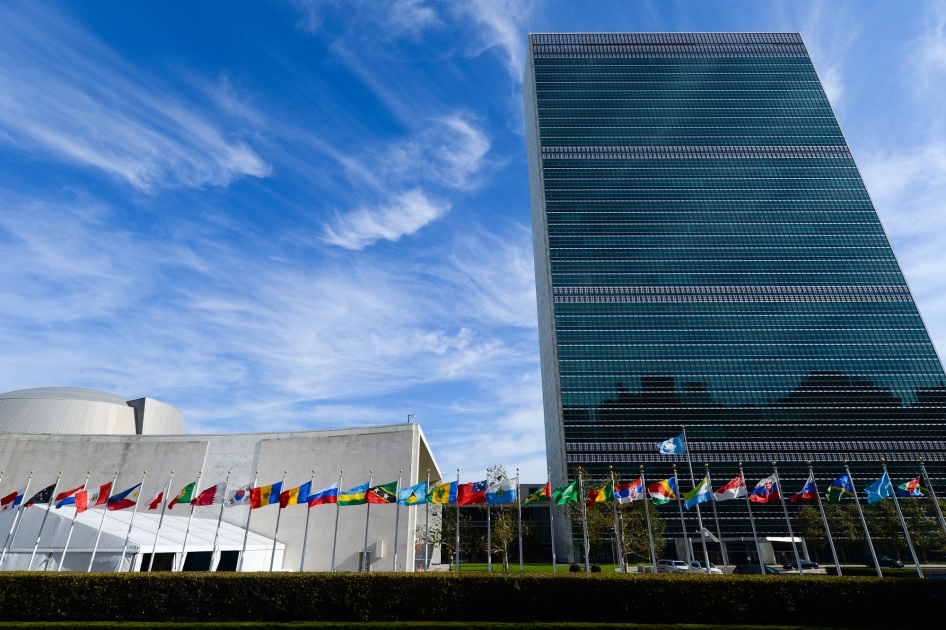Statement by Deputy Permanent Representative Anna Evstigneeva at Arria-formula meeting of UNSC members "Collective security through equitable burden sharing"
Mr.President,
We thank the delegation of Ghana for convening this discussion on issues of strengthening cooperation between the United Nations and regional mechanisms in the area of peacekeeping.
We thank High Representative of the African Union for the Peace Fund Mr. Donald Kaberuka, Vice President of the ECOWAS Commission Ms. Damtien Tchintchibidia and other briefers for their insights.
The cooperation of the United Nations with regional and sub-regional organizations is an indispensable element of the current global agenda in general and Security Council’s agenda in particular. We stand for development of such interaction on the basis of the UN Charter, first of all its Chapter VIII.
Russia consistently supports self-reliant efforts of African states aimed at maintaining peace and security on the continent. We advocate for progressive development of cooperation among the United Nations, the African Union, and sub-regional organizations in Africa on the basis of the principle “African solutions to the African problems”.
We particularly highlight the importance of efforts of the African Union and sub-regional organizations in the area of prevention and mediation in dispute settlement. Africans normally have better knowledge of the local specifics and, what’s even more important, pursue no double agenda. Unfortunately, we can recall a multitude of examples when African mediator efforts were put in the backburner or deliberately undermined by external stakeholders.
We appreciate that the African Union strives to make prompt practical use of the African Standby Force established within the framework of the African Peace and Security Architecture.
We believe it justified that African countries have raised the issue of providing material and financial assistance to measures for maintenance of international peace and security, i.a. as part of UN-AU Partnership. We agree that enhancing predictability, reliability and flexibility of financing of African and joint UN-AU missions is a pivotal aspect. We have no principled objections to UN expanding the scope of its engagement in such missions, and we are ready for further constructive dialogue on this matter. Thereby we must note that this discussion has been held at the United Nations for many years by now, and we know too well what countries impede the adoption of meaningful decisions. As a pretext, they cite the lack of trust in African efforts; or sometimes make special pre-conditions related to human rights issues and the like.
In the meantime, Africans remain actively involved in maintaining peace and security on the continent, of which there are numerous examples. We pay tribute to the sacrifice of African states who contributed their contingents to AMISOM and now ATMIS to facilitate fight against ‘Al-Shabaab’. We know that agreement on issues of financial support for the AU Mission in Somalia does not come easily. It is positive that there is a number of effective UN institutions, the operation of which supports the work of ATMIS.
In this regard, let me stress that the key to the success of regional efforts is a common assessment by regional states of existing threats and ways to overcome them, as well as readiness to bear risks associated with response to such threats and create a coherent and effective command and control system. As for financing methods, no matter which of them suits the situation the best, in all instances the initiating countries should always have enough space for their own political decisions with regard to countering threats.
A good example from recent practice is provided by Mozambique, the Southern African Development Community (SADC), and Rwanda who joined efforts in order to counter terrorist threats in Cabo Delgado. At a SADC summit in January, states confirmed that “serous progress” had been achieved since the deployment of troops in Mozambique. Another important achievement of SADC in the area of combating terrorism was the establishment in March 2022 of the SADC Regional Counter Terrorism Centre in Tanzania. We note the provision of financial support and aviation equipment by the Europeans.
There are more successful cases that occurred in the recent past. For example, the activity of the AU Regional Task Force Against the ‘Lord’s Resistance Army’ in northern Uganda, and also the fight against ‘Boko Haram’.
Russia renders multidimensional support to African efforts maintaining peace and security on the continent, i.a. through training of African military and law enforcement personnel at Russian facilities of higher education. Let me particularly underscore the training of peacekeepers (i.a. from Africa) at the UN-certified All-Russian Advanced Training Institute of the Ministry of Internal Affairs in Domodedovo, аs well as military training and research facility ‘Combined Arms Academy of the Armed Forces of the Russian Federation’ and the International Mine Action Center at the Russian Defense Ministry.
In conclusion, let me also point out that regional organizations act effectively not only in Africa. For example, in Eurasia, there is the Collective Security Treaty Organization. During the events in Kazakhstan in January this year the CSTO got its first positive peacekeeping experience. When Kazakhstan was faced with an unprecedented threat challenging its independence, sovereignty and integrity, it was only the effective response of the authorities and legitimate and prompt assistance of the CSTO that helped prevent a disaster.
Thank you.
